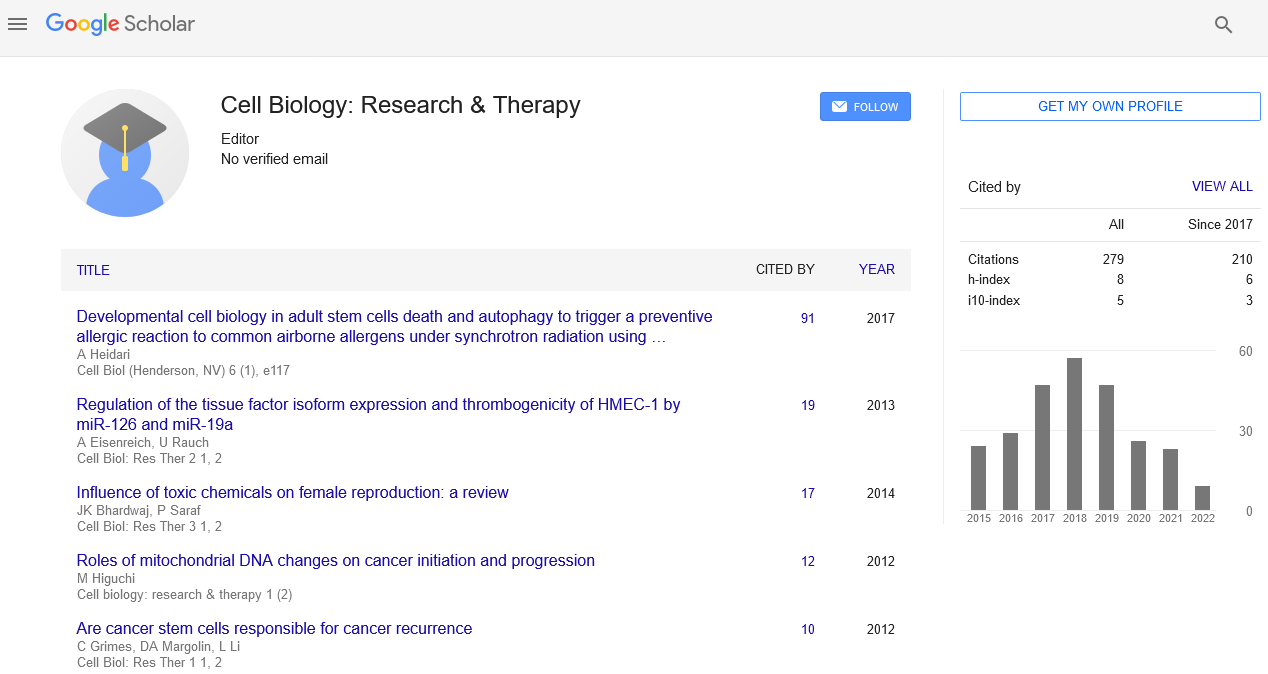Opinion Article, Cell Biol Vol: 12 Issue: 4
Integrating Research and Therapeutic Strategies: Exploring Cellular Targets in Precision Oncology
Liam Brown*
1Department of Cellular and Gene Therapies, California Institute of Technology (Caltech), Pasadena, USA
*Corresponding Author: Liam Brown,
Department of Cellular and Gene
Therapies, California Institute of Technology (Caltech), Pasadena, USA
E-mail: brownliam@gmail.com
Received date: 27 November, 2023, Manuscript No. CBRT-24-125272;
Editor assigned date: 29 November, 2023, Pre QC No. CBRT-24-125272 (PQ);
Reviewed date: 14 December, 2023, QC No. CBRT-24-125272;
Revised date: 21 December, 2023, Manuscript No. CBRT-24-125272 (R);
Published date: 29 December, 2023, DOI: 10.4172/2324-9293.1000197
Citation: Brown L (2023) Integrating Research and Therapeutic Strategies: Exploring Cellular Targets in Precision Oncology. Cell Biol 12:4.
Description
Precision oncology represents a transformative paradigm in cancer treatment, aiming to tailor therapeutic interventions based on the specific genetic, molecular, and cellular characteristics of an individual's tumor. This study explores the intricacies of cellular targets in precision oncology, focusing on how cutting-edge research insights are seamlessly integrated into therapeutic strategies to enhance treatment precision and efficacy while minimizing adverse effects. Precision oncology begins with an in-depth analysis of the tumor's genetic landscape through genomic profiling. Technologies like Next-Generation Sequencing (NGS) enable the identification of mutations, copy number variations, and other genetic alterations within cancer cells. This comprehensive analysis helps pinpoint specific cellular targets driving tumor growth.
Molecular subtyping classifies tumors into distinct subgroups based on their molecular characteristics. For instance, breast cancer can be subtyped into categories like HER2-positive or hormone receptorpositive. This classification allows researchers and clinicians to identify specific cellular targets associated with each subtype, guiding the selection of targeted therapies. Precision oncology targets key cellular signaling pathways that drive cancer progression. Oncogenic pathways, such as the PI3K/AKT/mTOR pathway or the RAS/RAF/MEK pathway, are often dysregulated in cancer cells. Targeted therapies, including small molecule inhibitors and monoclonal antibodies, aim to block these pathways, halting aberrant cellular signaling and inhibiting tumor growth.
In cancers where Epidermal Growth Factor Receptor (EGFR) is overexpressed or mutated, such as Non-Small Cell Lung Cancer (NSCLC) or colorectal cancer, targeted therapies like EGFR inhibitors (e.g., erlotinib, cetuximab) disrupt the signaling cascade mediated by EGFR, inhibiting cellular proliferation and promoting apoptosis. Immunotherapy has emerged as a revolutionary approach in precision oncology. Immune checkpoint inhibitors, such as PD-1 and PD-L1 inhibitors, unleash the body's immune system to recognize and attack cancer cells. By blocking inhibitory signals, these therapies enhance the anti-tumor immune response, providing a targeted and personalized treatment option.
Research in precision oncology has identified biomarkers like Tumor Mutational Burden (TMB) to predict the response to immunotherapy. Tumors with high TMB tend to have a greater number of neoantigens, making them more susceptible to immune checkpoint inhibitors. Integrating TMB assessment into treatment decisions enhances the precision of immunotherapeutic strategies. Hormone receptor-positive cancers, such as breast and prostate cancers, rely on hormonal signaling for growth. Precision oncology employs endocrine therapies, such as aromatase inhibitors or antiandrogens, to specifically target hormone receptors and disrupt the signaling pathways that fuel tumor progression. Research has elucidated the role of BRCA mutations in impairing DNA damage repair mechanisms in cancer cells. Precision oncology leverages this knowledge by using PARP inhibitors, a class of targeted therapies, to exploit the weakened DNA repair capabilities in BRCA-mutated tumors, leading to synthetic lethality and cell death.
Advancements in precision oncology research include the development of Patient-Derived Xenografts (PDX) and organoid models. These models allow researchers to recreate a patient's tumor in the laboratory, providing a platform for testing the efficacy of different therapies before initiating treatment. This personalized approach aids in selecting the most effective therapeutic strategy for an individual patient. Liquid biopsies, which involve the analysis of circulating tumor DNA (ctDNA) in blood samples, offer a dynamic and non-invasive approach to monitor treatment response and detect emerging resistance mechanisms. Integrating liquid biopsies into precision oncology allows for real-time adjustments to treatment strategies based on evolving cellular targets.
Conclusion
Precision oncology, with its focus on understanding and targeting specific cellular features of tumors, represents a paradigm shift in cancer treatment. The integration of cutting-edge research insights into therapeutic strategies allows for a highly personalized and effective approach, minimizing the side effects associated with traditional chemotherapy. By identifying and targeting specific cellular targets, from genomic alterations to dysregulated signaling pathways, precision oncology exemplifies the potential to revolutionize cancer care, offering patients tailored treatments that maximize efficacy and minimize adverse effects. As research continues to unravel the complexities of cancer biology, precision oncology will remain at the forefront of innovative and transformative cancer therapies.
 Spanish
Spanish  Chinese
Chinese  Russian
Russian  German
German  French
French  Japanese
Japanese  Portuguese
Portuguese  Hindi
Hindi 